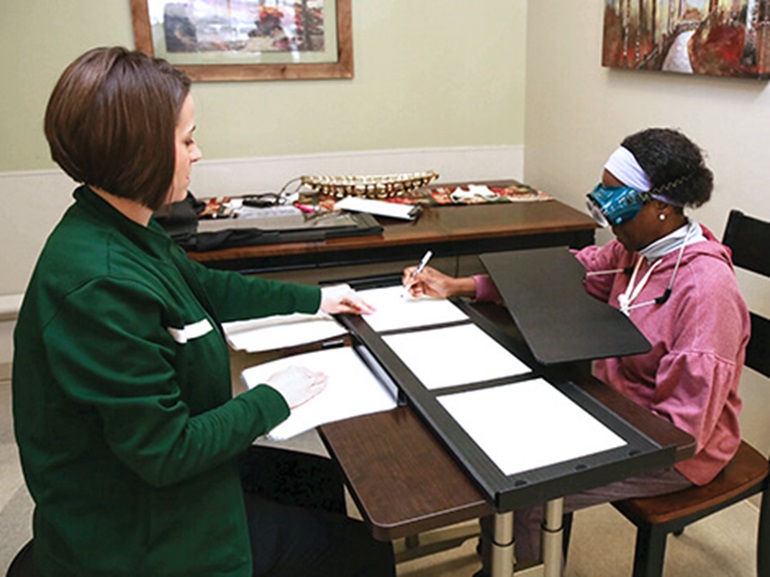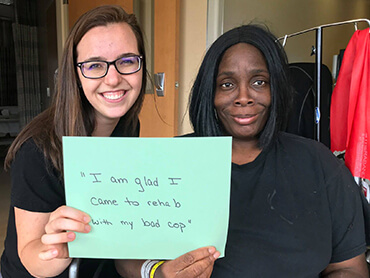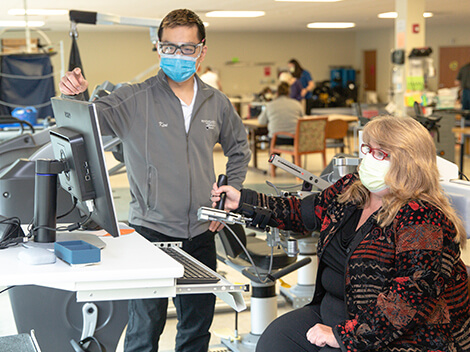Stroke Rehabilitation

What sets us apart
Helen M. Simpson Rehabilitation Hospital treats patients with a wide range of complex medical, physical, cognitive and emotional needs. This gives us unparalleled expertise and experience to address your individual challenges, goals and hopes for the future.
-
Stroke survivors who choose an inpatient rehabilitation hospital have greater improvement and fewer complications, and are able to return home sooner than those treated at nursing facilities or other settings.1,2,3 At Helen M. Simpson Rehabilitation Hospital, you’ll find a highly individualized, carefully integrated program of stroke care that has been shown to make the difference in patients’ outcomes.
-
Stroke rehabilitation requires the sustained and coordinated effort of a large inter-professional team. Communication and coordination among team members is paramount in maximizing the effectiveness and efficiency of rehabilitation.1
At Helen M. Simpson Rehabilitation Hospital, we draw on the knowledge of an experienced team of stroke rehabilitation specialists to address the range of medical, physical, functional and emotional issues you face.
This interdisciplinary team is led by a physiatrist, a physician board-certified in physical medicine and rehabilitation and includes rehabilitation nurses; physical, occupational and speech therapists; dietitians; case managers and other clinical and support staff as needed.
-
Studies show that the sooner you begin a highly coordinated, comprehensive stroke rehabilitation program, the greater gains you are likely to achieve.1 As a specialized hospital, Helen M. Simpson Rehabilitation Hospital offers you an early start to rehabilitation. We work closely with you, your family and the referring hospital to ensure a smooth transition to our program.
Here you will benefit from a minimum of three hours of physical, occupational and/or speech therapies a day, five days a week. The skills and strategies you learn during therapy will be reinforced by your nursing team.
Depending on the nature and extent of your stroke, you may be provided with a wheelchair and/or other assistive equipment including electronic aids to assist with daily tasks during your admission.
You and your family will also receive education and training to help maintain your overall health and well-being following discharge.
When you’re ready, we’ll coordinate your discharge, help arrange for equipment and provide access to community resources that may be available to you. Our goal, like yours, is for you to move forward with as much independence and confidence as possible.
-
Treatment is carefully integrated and tailored to your specific needs and goals. Depending on the extent to which you have been impacted by a stroke, we will help:
- Restore physical function and the ability to perform daily activities
- Gain strength and endurance
- Improve balance and mobility
- Overcome speech or communication deficits
- Address swallowing issues or nutritional concerns
- Develop new cognitive, communication and behavioral strategies
- Improve vision deficits
- Deal with emotional, psychological and/or social challenges
- Return to home, work, school or community activities with as much confidence and independence as possible
Helen M. Simpson Rehabilitation Hospital’s highly individualized program will also help to maximize recovery for patients whose needs may be complicated by other existing medical conditions.
-
Aquatic therapy is a safe, effective form of rehabilitation for those who may have difficulty exercising on land.
The buoyancy of water supports the body helping ease an individual’s fear of falling and promoting mobility, balance, strength and improving gait. Buoyancy, resistance and heat are some of the key elements that make aquatic therapy ideal in addressing balance, upper and lower extremity stretching and walking progression. Our pool is heated, wheelchair-accessible and equipped with gait observation cameras.
Our care team will determine whether you may benefit from aquatic therapy.
*Please note: aquatic therapy is not currently being offered due to COVID-19 restrictions. We hope to offer it again in the near future.
-
To help you return home and resume work, school, community and/or social activities, Helen M. Simpson Rehabilitation Hospital provides an unparalleled continuum and continuity of care. We are here to help you manage your health from inpatient to outpatient care.

The technology of stroke recovery

To support your recovery, Helen M. Simpson Rehabilitation Hospital brings innovation and cutting-edge technologies to treatment.
Below are some of the many advances now available to appropriate patients:
- Robotic therapies, including the Armeo Spring®, to improve motor function in the arms and hands
- Body-weight supported track system to improve balance, gait and walking
- Electrical stimulation, mirror therapy and other strategies to improve arm and hand function
- VitalStim®, a non-invasive external electrical stimulation therapy, applied to the neck, to treat swallowing disorders
- Interactive gaming and computer-based exercises to improve memory, concentration, decision-making and other cognitive skills
Stroke Recovery. Let Us Help.
Did You Know?
1Guidelines for Adult Stroke Rehabilitation and Recovery. American Heart Association, Inc. 2016.
2Comparison of Functional Status Improvements Among Patients with Stroke Receiving Postacute Care in Inpatient Rehabilitation vs. Skilled Nursing Facilities. JAMA. 2019.
3Assessment of Patient Outcomes of Rehabilitative Care Provided in Inpatient Rehabilitation Facilities (IRFs) and After Discharge. Dobson DaVanzo & Associates, LLC. 2014.